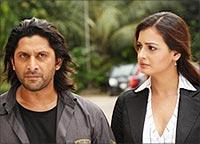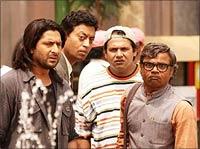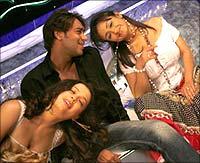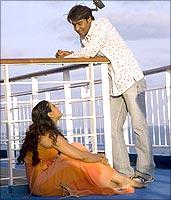By Raja Sen for Rediff.com, Click Here for Original. You know what? Ram Sampath was right to sue; he made the best part of Krazzy 4. A while after leaving theatres, all that resonates in your ears from Jaideep Sen's directorial debut is that Sony Ericsson track Hrithik Roshan (and Shah Rukh Khan) took turns grooving to, the younger star doing significantly better than the older, who seemed to alarmingly have a 'bit of a Michael Jackson thing going on.' Anyway, this is not the place to discuss item numbers (and I'm certainly not keen to discourse on Irrfan Khan's attempts at rubbing out Rakhi Sawant's tattoo), and convention dictates this is where we talk about the film. Sigh. Must we? Add to that a hearty Bollywood dose of message-filmmaking, extraneous patriotism and good ol' backstory-masala, and -- on paper, as we said -- there must have been a few gleaming grains of potential. Toss in a few capable actors, producer Rakesh Roshan might have justifiably reasoned, and we're cooking. The problem, however, despite all the excessive slapstick elements well in place, lies with the script. Relying purely on actor-expressions and a few moments of action can't quite do the job. The cast is a decidedly fine mix as Rajpal Yadav, Irrfan Khan, Arshad Warsi and Suresh Menon get to pirouette around Juhi Chawla and Dia Mirza while Zakir Hussain and Rajat Kapoor look on -- but there's only so much good timing can do without authentic punchlines. There's nothing offensively 'wrong' with Krazzy 4, especially compared to the atrocities served up nowadays. It's almost a throwback to older funny-movies, and the farce never quite enters modern day (read Priyadarshan) territory. The film seems to have its heart in the right place, tries to pretend there's a message, albeit vague. For all its naivete, it could actually have been quite charming. On paper, there must have been something to Jaideep Sen's directorial debut that made sense. A reworking of hackneyed Michael Keaton starrer Dream Team, the film is about four madmen of varying mental disability out on the town and involved in a kidnapping plot.
On paper, there must have been something to Jaideep Sen's directorial debut that made sense. A reworking of hackneyed Michael Keaton starrer Dream Team, the film is about four madmen of varying mental disability out on the town and involved in a kidnapping plot.
Please note that this piece has been reproduced from Rediff.com, Click Here for Original.
So we have Angry Arshad, Freedom-Fighter Rajpal, Irrfan the Compulsive Cleaner and -- in a bizarre bit of miscasting for a talented mimic -- Menon the Mute, all heading out to watch an India-England cricket match on Independence day, something Dr Juhi Chawla thinks would teach them the value of teamwork. Naturally, all hell breaks loose as our titular quartet squabble and huddle together to save the day against all odds. There are a couple of well-conceived sequences, like a mall-full of shoppers standing at attention during the national anthem hitting out at goons for not doing the same, and the idea of a begging song, but the jokes are lost in the execution. As said, it's not horrible. You can watch the film without cringing, and indulgently smile at where what is going wrong and, figuring out how the real joke might have sounded as intended, chuckle a bit. And honestly, this isn't a film we're trying to make sense of, or nitpicking about plot detail: make it loony, for god's sake, go wild but try and make it funny, instead of hoping Irrfan's and Rajpal's faces do the trick. And so we are better off discussing the item track, SRK's MJ routine and Hrithik's impressively fluid vertebrae managing to at least hold viewer attention and giving us a bit of a thump. Well, at least more than the film. Rediff Rating:  Except, um... it's just not funny.
Except, um... it's just not funny.
 I say surprising because, like all movies where a poignant second half is overcompensated for by an exaggeratedly happy first act, Devgan starts off making you almost squirm in your seat with his swaggering portrayal of the self-proclaimed smooth operator, whose idea of hitting on a girl involves lots of Hallmark lines and shirts itemgirl-istically bereft of buttons.
I say surprising because, like all movies where a poignant second half is overcompensated for by an exaggeratedly happy first act, Devgan starts off making you almost squirm in your seat with his swaggering portrayal of the self-proclaimed smooth operator, whose idea of hitting on a girl involves lots of Hallmark lines and shirts itemgirl-istically bereft of buttons. The best thing about Devgan's directorial debut is that he shows enough confidence in his script to not dumb it down.
The best thing about Devgan's directorial debut is that he shows enough confidence in his script to not dumb it down. 
 It would be wrong to slot KRAZZY 4 as a comedy. Sure, KRAZZY 4 remains faithful to the ongoing trend of providing laughs at the oddest of things, but it's more of a masala fare that's reminiscent of the 1980s cinema. Packaged in a modern avatar, of course.
It would be wrong to slot KRAZZY 4 as a comedy. Sure, KRAZZY 4 remains faithful to the ongoing trend of providing laughs at the oddest of things, but it's more of a masala fare that's reminiscent of the 1980s cinema. Packaged in a modern avatar, of course. Irrfan Khan is Dr. Mukherjee: He has decided that he's the Captain of the team! But so obsessed is he by the need to be in control of a situation, he doesn't realise he's totally lost control of himself and his mind.
Irrfan Khan is Dr. Mukherjee: He has decided that he's the Captain of the team! But so obsessed is he by the need to be in control of a situation, he doesn't realise he's totally lost control of himself and his mind. Jaideep Sen shows a flair for comedy, but had the debutante director opted for a slightly novel screenplay, it would've taken the film to another level. A few comic scenes are well executed and in terms of execution, Jaideep knows the grammar right.
Jaideep Sen shows a flair for comedy, but had the debutante director opted for a slightly novel screenplay, it would've taken the film to another level. A few comic scenes are well executed and in terms of execution, Jaideep knows the grammar right.

 Aamir Khan has raised the bar with TAARE ZAMEEN PAR. Comparisons between Aamir and Ajay Devgan, who makes his directorial debut with U ME AUR HUM, would be erroneous, but you can't turn a blind eye to the fact that the viewer would expect an encore with U ME AUR HUM. Will U ME AUR HUM live up to the humungous hype and expectations? Does Devgan have the trappings of a fine storyteller? Oh yes, he does!
Aamir Khan has raised the bar with TAARE ZAMEEN PAR. Comparisons between Aamir and Ajay Devgan, who makes his directorial debut with U ME AUR HUM, would be erroneous, but you can't turn a blind eye to the fact that the viewer would expect an encore with U ME AUR HUM. Will U ME AUR HUM live up to the humungous hype and expectations? Does Devgan have the trappings of a fine storyteller? Oh yes, he does! The first time Ajay [Ajay Devgan] saw Pia [Kajol], she served him drinks. She affected him more than the alcohol, it was love at first sight. The first time Pia saw Ajay, he had a drink too many. She watched him make a fool of himself and was relieved when he passed out.
The first time Ajay [Ajay Devgan] saw Pia [Kajol], she served him drinks. She affected him more than the alcohol, it was love at first sight. The first time Pia saw Ajay, he had a drink too many. She watched him make a fool of himself and was relieved when he passed out. The first hour, strictly average in terms of writing, has several sunshine moments. It's breezy, funny, at times silly, but interesting. What also catches your eye is the eye-filling cinematography [Aseem Bajaj in top form, yet again] on the cruise. The songs, the glam look, the subtle humor… you don't take to the film instantly, but you know for a fact that a volcano is brewing.
The first hour, strictly average in terms of writing, has several sunshine moments. It's breezy, funny, at times silly, but interesting. What also catches your eye is the eye-filling cinematography [Aseem Bajaj in top form, yet again] on the cruise. The songs, the glam look, the subtle humor… you don't take to the film instantly, but you know for a fact that a volcano is brewing. Robin Bhatt, Sutanu Gupta and Akarsh Khurana's screenplay casts a hypnotic spell in the second hour. Sure, the germ stems from THE NOTEBOOK [2004; James Garner, Gena Rowlands, Rachel McAdams], but the writers have altered the screenplay keeping Indian sensibilities in mind. It works! Ashwani Dhir's dialogues touch the core of your heart. Every spoken sentence has a meaning. Vishal Bhardwaj's music may not be a chartbuster, but it alternates between soulful and melancholic beautifully. Aseem Bajaj's cinematography is topnotch. Monty Sharma's background score is effective.
Robin Bhatt, Sutanu Gupta and Akarsh Khurana's screenplay casts a hypnotic spell in the second hour. Sure, the germ stems from THE NOTEBOOK [2004; James Garner, Gena Rowlands, Rachel McAdams], but the writers have altered the screenplay keeping Indian sensibilities in mind. It works! Ashwani Dhir's dialogues touch the core of your heart. Every spoken sentence has a meaning. Vishal Bhardwaj's music may not be a chartbuster, but it alternates between soulful and melancholic beautifully. Aseem Bajaj's cinematography is topnotch. Monty Sharma's background score is effective. Let's get one thing straight: You haven't watched anything so opulent, so magnificent like this in a long, long time on the Hindi screen. It's not just body beautiful, but there's soul as well.
Let's get one thing straight: You haven't watched anything so opulent, so magnificent like this in a long, long time on the Hindi screen. It's not just body beautiful, but there's soul as well. As a cinematic experience, it would be wrong to compare JODHAA AKBAR to any of Ashutosh Gowariker's previous endeavors. Why, it would be erroneous to compare the film with any film ever made before in this genre. This one stands out and stands out the tallest.
As a cinematic experience, it would be wrong to compare JODHAA AKBAR to any of Ashutosh Gowariker's previous endeavors. Why, it would be erroneous to compare the film with any film ever made before in this genre. This one stands out and stands out the tallest. Ashutosh Gowariker knows that historicals have to be simplified while narrating on celluloid so that the moviegoer is able to grasp and comprehend the plotline and the sequence of events. Thankfully, JODHAA AKBAR is not in the least difficult to decipher. Gowariker's handling of the subject deserves the highest praise, for it's not everyday that you come across a film like JODHAA AKBAR.
Ashutosh Gowariker knows that historicals have to be simplified while narrating on celluloid so that the moviegoer is able to grasp and comprehend the plotline and the sequence of events. Thankfully, JODHAA AKBAR is not in the least difficult to decipher. Gowariker's handling of the subject deserves the highest praise, for it's not everyday that you come across a film like JODHAA AKBAR. Aishwarya Rai Bachchan is superb. Oh yes, she looks ethereal -- a compliment she has heard a trillion times before. What's new in that? But watch her emote in this film. You realize the amazing talent that has hitherto not been tapped by any movie maker. A flawless performance indeed!
Aishwarya Rai Bachchan is superb. Oh yes, she looks ethereal -- a compliment she has heard a trillion times before. What's new in that? But watch her emote in this film. You realize the amazing talent that has hitherto not been tapped by any movie maker. A flawless performance indeed! An actor enacting dual roles isn't new for Bollywood. Dilip Kumar [RAM AUR SHYAM], Rajesh Khanna [SACHCHA JHOOTHA], Amitabh Bachchan [SATTE PE SATTA], Hema Malini [SEETA AUR GEETA], Sridevi [CHAALBAAZ], Shah Rukh Khan [DUPLICATE], Salman Khan [JUDWAA]… over the years, a number of makers have woven stories around humshakals/twins.
An actor enacting dual roles isn't new for Bollywood. Dilip Kumar [RAM AUR SHYAM], Rajesh Khanna [SACHCHA JHOOTHA], Amitabh Bachchan [SATTE PE SATTA], Hema Malini [SEETA AUR GEETA], Sridevi [CHAALBAAZ], Shah Rukh Khan [DUPLICATE], Salman Khan [JUDWAA]… over the years, a number of makers have woven stories around humshakals/twins. Kunal [Kunal Khemu] defines the youth of today. He dares to dream of making it big in Bollywood one day.
Kunal [Kunal Khemu] defines the youth of today. He dares to dream of making it big in Bollywood one day. Also, as mentioned at the outset, the film could've done with better editing. Ideally, it can [and should] be trimmed by at least 20 minutes for a better impact.
Also, as mentioned at the outset, the film could've done with better editing. Ideally, it can [and should] be trimmed by at least 20 minutes for a better impact. We're experiencing a whole new world in cinema. Themes that were considered abstract and offbeat are slowly making inroads into Bollywood. These films are a complete contrast to what we've been experiencing thus far. You could actually mistake it for European cinema in general and French cinema in particular. MITHYA, directed by Rajat Kapoor, is one of those films. Conceal the faces of the actors and you'd never believe it's a Hindi film.
We're experiencing a whole new world in cinema. Themes that were considered abstract and offbeat are slowly making inroads into Bollywood. These films are a complete contrast to what we've been experiencing thus far. You could actually mistake it for European cinema in general and French cinema in particular. MITHYA, directed by Rajat Kapoor, is one of those films. Conceal the faces of the actors and you'd never believe it's a Hindi film. On script level, a film like MITHYA has layers and more layers and is indeed a complex theme to handle. Not everyone can attempt it, since a theme like this has to be handled very, very carefully, else it may boomerang. That's where an expert storyteller like Rajat Kapoor steps in.
On script level, a film like MITHYA has layers and more layers and is indeed a complex theme to handle. Not everyone can attempt it, since a theme like this has to be handled very, very carefully, else it may boomerang. That's where an expert storyteller like Rajat Kapoor steps in. Lavish praises must be reserved for Ranvir Shorey, who delivers an extra-ordinary performance in the central role. You've known him as a funster, now watch him in a role that you could never place him in. A brilliant performance! Naseeruddin Shah, as always, is hugely competent. Neha Dhupia is one of the most under-rated actors around. Watch her in this film as she slips into a role with such effortless ease. She deserves better roles for sure. Iravati is fantastic. Saurabh Shukla is first-rate. Harsh Chhaya excels. Vinay Pathak is relegated to the backseat this time; he's good. Brijendra Kala is excellent.
Lavish praises must be reserved for Ranvir Shorey, who delivers an extra-ordinary performance in the central role. You've known him as a funster, now watch him in a role that you could never place him in. A brilliant performance! Naseeruddin Shah, as always, is hugely competent. Neha Dhupia is one of the most under-rated actors around. Watch her in this film as she slips into a role with such effortless ease. She deserves better roles for sure. Iravati is fantastic. Saurabh Shukla is first-rate. Harsh Chhaya excels. Vinay Pathak is relegated to the backseat this time; he's good. Brijendra Kala is excellent.

